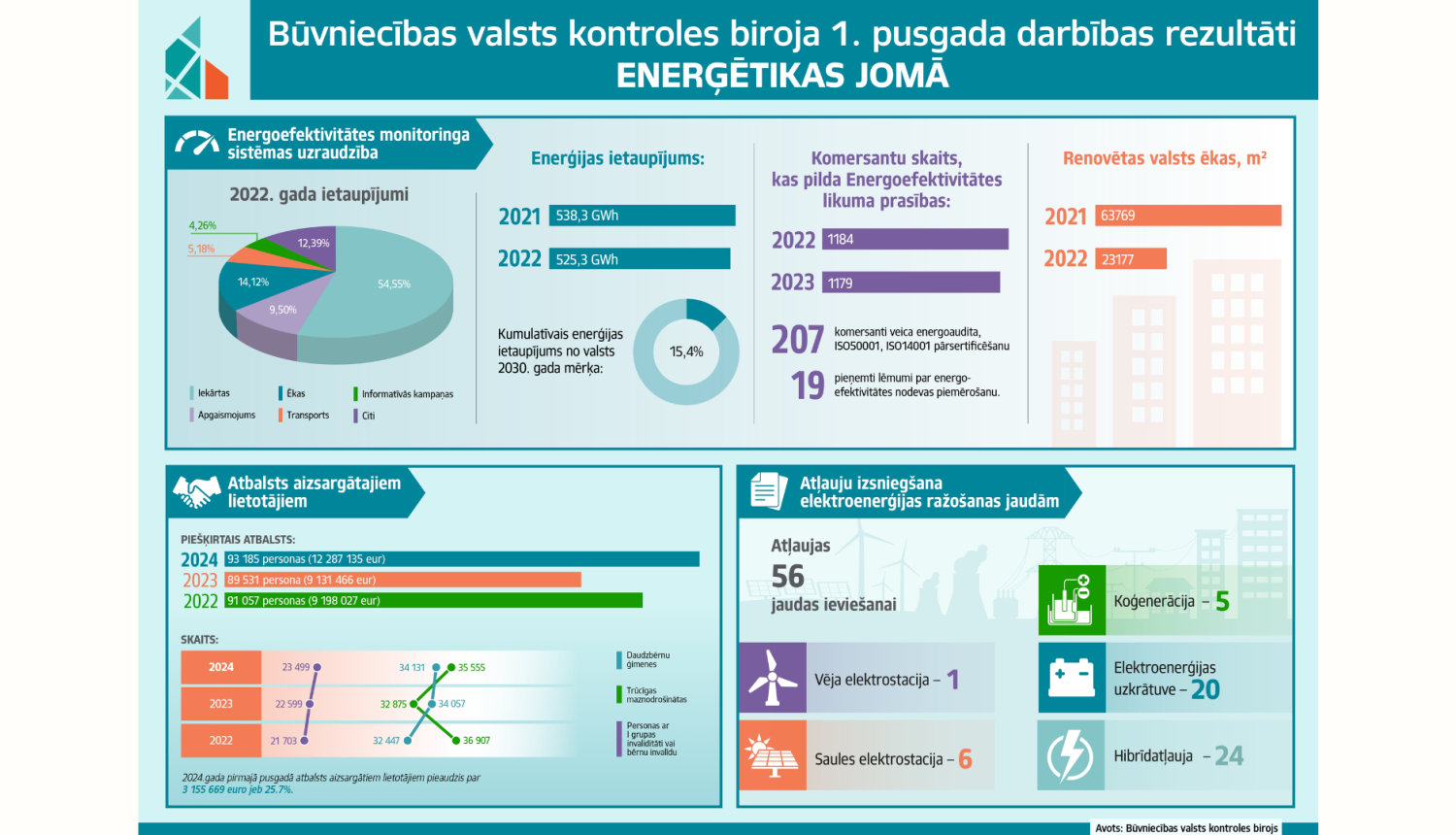In the first half of 2024, the State Building Control Bureau (SCCB) issued permits for a total power generation capacity of 842.1 MW. Six permits were granted for solar power plants (280.95 MW), one permit for a wind power plant (80 MW), and 20 permits for electricity storage (136.09 MW). There were also 24 hybrid permits combining a power generation facility and a storage facility with a total permitted potential generation capacity of 318.26 MW.
Since 1 January this year, The SCCB has been issuing permits for expanding, upgrading, and setting up new power generation facilities whose capacity is or exceeds 500 kilowatts. Obtaining a permit does not necessarily mean that the recipient will install generation capacity specified in the permit, as the implementation of projects is affected by the available grid capacity. During the reporting period, a total of 62 permits were issued for the installation of new power generation facilities or for increasing the capacity of existing ones, and 104 decisions were made as part of reviewing permits previously issued by the Ministry of the Economy and the Ministry of Climate and Energy. Information about the permits issued makes it possible to track the type of power plants the developers want to set up, and their capacity, ensuring that the same rules and requirements apply.
Sustainability certificates and greenhouse gas (GHG) emission criteria
This is the first year in which merchants (biofuel suppliers and producers of biomass or biogas heat or electricity) will provide certificates of compliance with sustainability and GHG emissions reduction criteria. For this purpose, the SCCB developed new functions for its Energy Resource Information System (ERIS). ERIS has been available to its users since 2023 and offers a number of modules aimed at relieving the administrative burden, facilitating the collection of better-quality data, and enabling both the users and the SCCB to analyse them.
Given the fact that this year is the first in which merchants have to provide information on the compliance of biofuels, solid biomass fuel, or biogas with sustainability and GHG emissions criteria, the SCCB organised three information seminars in the first half of this year, informing merchants of the requirements of laws and regulations, certification options, and submission of data in ERIS.
Energy efficiency monitoring
The total new energy savings recorded in ERIS for 2022 amount to 525.288 GWh. Combined with the 2021 savings, the cumulative energy savings for the period up to 2030 are expected to be as high as 3147.883 GWh, which is 15.4% of the mandatory national target for 2030.
In 2022, large businesses and large electricity consumers saved 126.233 GWh of energy, 22% more than in 2021. Municipal and public institutions saved 25% more in 2022, with a total of 9.393 GWh.
The 2023 list of large companies includes 272 businesses, while the list of large electricity consumers includes 1104 entities. These merchants have one year to comply with the Energy Efficiency Law: they must conduct an energy audit of their company or implement an energy management or environmental management system with additions.
Support for protected users
In the first six months of 2024, EUR 12.3 million was allocated to protected users eligible for assistance aimed at reducing their electricity bills through the Protected User Data Information System (ALDIS). Protected users include large families, which received EUR 5.1 million as assistance; persons with disability group I and families with disabled children, which were granted a total of EUR 2.8 million; and poor and low-income persons, which were provided with EUR 4.3 million.
Awards received
SCCB is a national administrative institution under the supervision of the Ministry of Economics, which began its work on 1 October 2014. This year marks 10 years since its creation. Since 2020, the bureau has also been in charge of the energy administration function.
In March 2024, the SCCB received the ‘Energovienoti’ (‘Connected in Energy’) sustainable best practice certificate issued by the Riga Technical University Institute of Energy Systems and Environment for its contribution to the assessment and reduction of energy consumption. The award is issued to companies and organisations with a high level of energy expertise whose decisions and actions set a good example to others.



